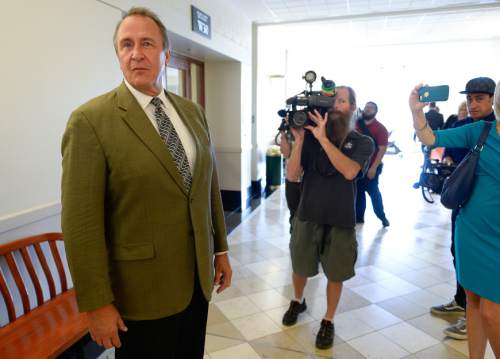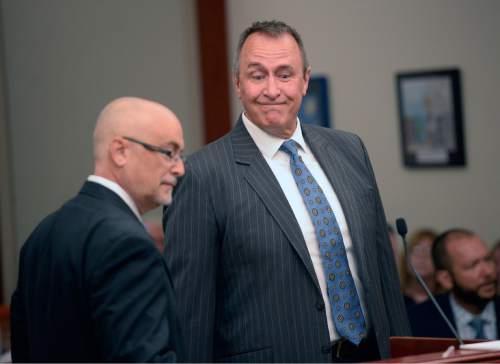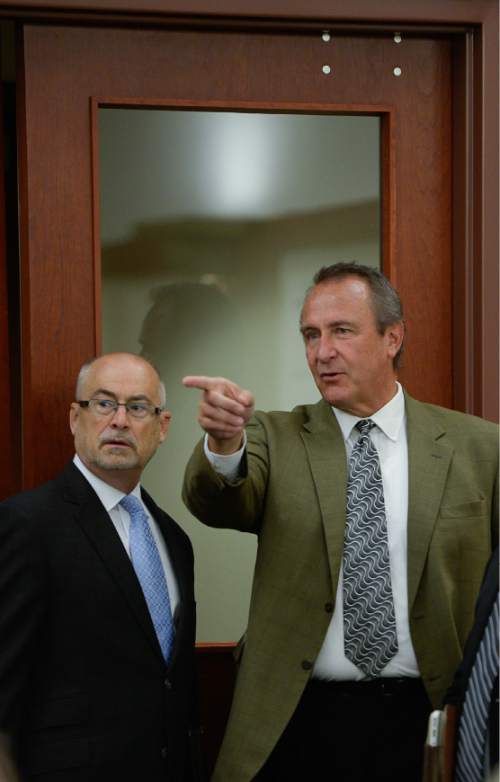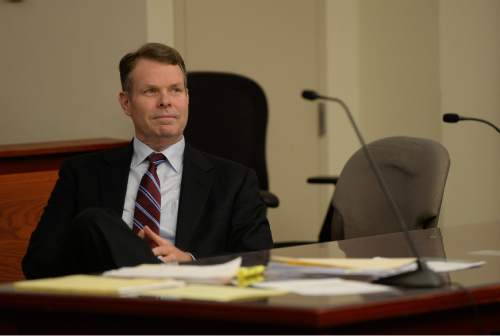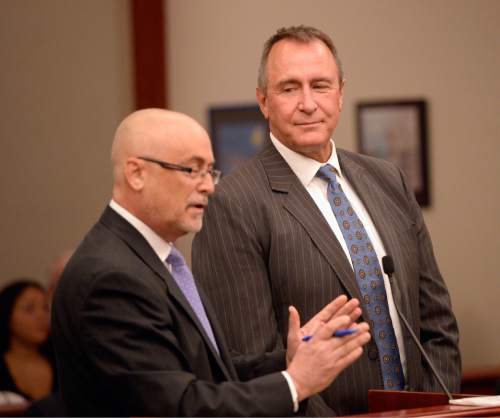This is an archived article that was published on sltrib.com in 2016, and information in the article may be outdated. It is provided only for personal research purposes and may not be reprinted.
Former Utah Attorney General Mark Shurtleff has asked a judge to dismiss the public corruption case filed against him two years ago, asserting in new court papers that his constitutional right to a speedy trial has been violated by delays caused by the inability of state prosecutors to extract key evidence from the federal government.
The more-than-80-page motion, which also includes hundreds of pages of exhibit documents, was filed late Friday in Salt Lake City's 3rd District Court.
The case against the former Republican officeholder was filed in July 2014, and a trial is set for October.
"Mr. Shurtleff has suffered significant anxiety and concerns arising out of the personal, media and financial pressure that will continue unabated until trial or dismissal," his attorney Richard Van Wagoner wrote. "The more time that passes, the greater prejudice to Mr. Shurtleff."
Shurtleff's attorneys want the case dismissed "with prejudice," meaning that if 3rd District Judge Elizabeth Hruby-Mills agrees, the charges filed against him could not be brought again.
Shurtleff, 58, has pleaded not guilty to five felonies and two misdemeanors, including counts of accepting prohibited gifts, obstructing justice, official misconduct and bribery to dismiss a criminal proceeding. If convicted of the charges, he could spend up to 30 years in state prison.
The charges stem from a sweeping multiyear investigation by state and federal agents of alleged bribery and misconduct by Shurtleff and his successor, former Attorney General John Swallow, who faces separate charges.
Shurtleff's motion to dismiss says the criminal counts brought against him have "no basis in law or fact," and it notes that Davis County Attorney Troy Rawlings spent a year deciding to amend the original charges and a second one fighting a nearly fruitless battle with the FBI and federal prosecutors over evidence.
The document also argues that Shurtleff's case was unfairly built on an investigation that was fueled by "a series of materially false statements and material omissions" of fact by the "task force" of state and federal investigators and prosecutors who handled the probe that preceded the charges.
"Mr. Shurtleff contends the task force used the false statements and material omissions to unconstitutionally and illegally invade his home and personal effects," court papers say. "He also contends the materially false warrant affidavits, which were inevitably unsealed, created a false public narrative about Mr. Shurtleff's conduct."
In a response late Friday, Rawlings, who is prosecuting Shurtleff, asked the court for an evidentiary hearing to vet Shurtleff's claims; he also says he wants to put witnesses on the stand to answer questions under oath.
Those questions include an examination of claims that the state has been engaged in "dilatory conduct" and is the primary source of the delays.
"Let's find out," Rawlings wrote in court papers, noting that he has vigorously pursued the evidence that his office and Shurtleff's attorneys agree the federal government has withheld.
The same is true with regard to questions Shurtleff raised about the task force's refusal to provide information related to a possible conflict of interest that prevented the U.S. attorney's office in Utah from pursuing a case against the former attorney general, Rawlings wrote.
His office has not received any of those answers on its own.
"The state of Utah and the defendant must call witnesses to provide answers to the above questions in order for this court to see how those answers impact both defense and prosecution theories," he wrote.
The Shurtleff and Rawlings motions were filed after court business hours Friday, so it was not immediately clear how Hruby-Mills might respond.
In his motion to dismiss, Shurtleff's lawyers say they also seek an evidentiary hearing to confirm "investigatory misconduct," which they say concerns the "illegal manner in which the media received information" about Shurtleff's arrest and a raid on his home.
In support of the motion to dismiss, Shurtleff's attorneys filed multiple exhibits, including hundreds of pages of search warrants, court affidavits and other documents or records.
One of the exhibits appears to spell out Shurtleff's possible defenses by offering more specific information about events related to his interactions with campaign donors and other individuals, such as St. George businessman Jeremy Johnson, who was convicted of federal criminal charges, and Utah developer Marc Sessions Jenson, who claims he paid for access to Shurtleff at the same time that he negotiated a plea agreement on felony securities sales charges.
The document also details numerous instances in which Shurtleff believes investigators manipulated or omitted facts to justify obtaining the search warrants needed to raid his home.
Another exhibit mounts a case for the dismissal of the three felony gift charges on the grounds that they are invalid. That's because the evidence initially was used to bring bribery charges against Shurtleff and, according to his lawyers, Utah law doesn't allow for evidence in a bribery allegation to also be used to prove a violation of the gift statute.
In footnotes, Shurtleff's attorneys also say they plan to file an additional exhibit under seal because it contains information from other sealed court papers and may implicate third parties that could become subject to other criminal investigations.


